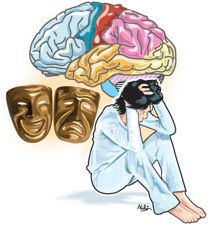The highs are very high and the lows are very low……..at the top of the world and then down in the depths of despair.
Extreme mood swings are a symptom of Bipolar Affective Disorder (BAD) or Manic Depressive Psychosis (MDP), says Consultant Psychiatrist and Senior Lecturer in Psychiatry Dr. Raveen Hanwella, explaining that it is colloquially referred to as “olmadaya” or madness.
Stressing that everyone has mood swings but they do not hinder a person’s functioning, he points out that those affected by MDP, a specific psychiatric illness, don’t suffer mere ups and downs, but huge mood fluctuations.
During the highs, the person is not only very active and energetic, overflowing with ideas but also imbued by grandiose illusions, with false notions of eminence and special powers, MediScene understands.
This is the time, he/she will have immense energy, working throughout the night, cleaning the house, doing up the garden etc. They can’t stop working but there isn’t much productivity, says Dr. Hanwella.
The danger not only to oneself but also to family and society lies in the fact that it is during such highs that they will indulge in spending sprees, maybe buying up a whole shop. Men may drink more alcohol. Those suffering from MDP will get into embarrassing situations, talk out of place and become sexually disinhibited.
Citing the serious repercussions untreated MDP could lead to, Dr. Hanwella points out that a high-level bank executive could easily jeopardize banking operations while a company’s chief executive officer could become reckless and indulge in foolish investments. Such people will scoff off any suggestions that they are mentally ill because they feel they are at a peak and nothing is wrong.
The lows are a sharp contrast, with the person feeling down and out sans any energy, hit by deep depression, unable to carry on with his/her routines, feeling useless and worthless and even suicidal, it is learnt.
This is the time to “catch” them and bring them to a psychiatrist, he says, because they are more amenable to seeking help when they hit a low and feel ill.
Otherwise, life will go on with high and low episodes in between relatively normal periods but not completely normal, because they will be dogged by relationship problems, says Dr. Hanwella.
MDP which could vary from mild, unnoticed and never treated to acute, is inherited in 70% of the cases, he says, usually with symptoms presenting themselves when a person is in his/her 20s. Lasting a lifetime, MDP could also be precipitated by a stressful event such as marriage, a loved one’s death, an examination or a physical illness.
It can, however, manifest itself in children as young as 10 years old and could very well be ignored as a behavioural problem. Such children may mistakenly be labelled as difficult or delinquent.
Dubbing MDP as being “very unpredictable”, he says that high and low episodes can come minutes, ,hours, days or even years apart. The disease which has no cure so far never runs out, getting worse with age.
However, it can and should be treated, stresses Dr. Hanwella, adding that it is wvital to do so to prevent lives and families being ruined. People with MDP can lead normal lives.
The treatment must be two pronged, MediScene understands – medication not only for the high and low episodes but also to prevent a recurrence of both types of episodes. The preventive medication would comprise a prophylaxis such as lithium to stabilize the affected person’s mood.
Unlike other ailments, MDP is complex. Effective treatment for this difficult disease is multiple drug therapy with close monitoring for balance as well as to curb side-effects. That is why, a psychiatrist should be consulted regularly.
Don’t shy away from treatment
If there are suspicions that you or a loved one is suffering from MDP, don’t feel embarrassed or shy to seek treatment.
For, some of the world’s ‘greats’ such as Britain’s war-time Prime Minister Winston Churchill and famous artist Van Gogh may well have been victims, with Churchill calling his depressive episodes when he was severely withdrawn “his Black Dog” .
The answer is to confront the problem and not only seek but also continue treatment. |


